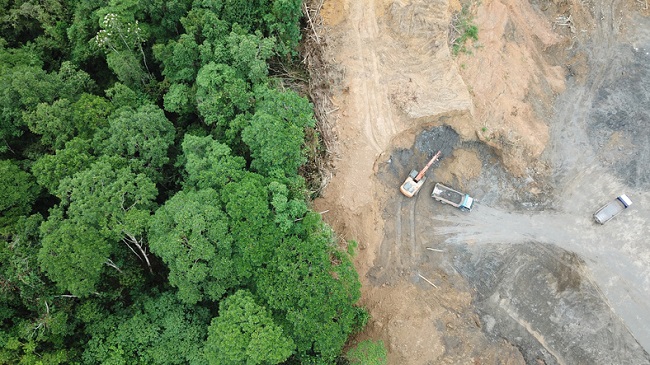Last year’s Dubai climate agreement was rightly attacked for being vague and watered down. However, it was extremely clear on at least one point – the importance of forests for climate. The text warns that halting and reversing deforestation by 2030 is critical to reducing emissions, but that “restoring and protecting natural ecosystems will result in large-scale CO2 absorption and co-benefits.” These “co-benefits” are the provisioning of much of life on earth.
Yet despite the centrality of forests to climate mitigation, burning forest biomass as a replacement for coal is increasing in the UK and worldwide as a climate strategy. The biomass industry and the UK government claim burning forest wood is “low carbon” and even “carbon neutral”, even though in reality, burning wood emits more CO2 than coal, and logging forests for fuel is an acknowledged driver of forest loss and degradation. Across the EU, more than half the wood harvest is burned for heat and power, generating energy that counts toward mandated renewable energy targets. Japan and Korea have followed climate-leader Europe in promoting biomass as a substitute for coal and are sourcing wood pellets from forests of Canada, Vietnam, and the United States.
Sadly, the UK is the apotheosis of this retrograde policy. One UK power plant, the Drax generating station in North Yorkshire, consumes more wood in a year than the entire country of Austria burns. Drax’s own wood pellet manufacturing arm is linked to the destruction of Canadian old growth forests, and the company purchases additional pellets from Enviva, a US-based company that is demonstrably felling some of the oldest, most carbon-rich forests of the Southeastern US to make biomass fuel.
Scientists have repeatedly warned UK policymakers that burning trees for energy is taking us backwards on climate change. Nearly ten years ago a UK-government commissioned study found that burning trees would increase emissions for decades compared to burning coal. Instead of heeding these warnings, however, the government’s 2023 Biomass Strategy confirms a continued commitment to burning trees for electricity. The new twist is that instead of just claiming biomass is “carbon neutral”, Drax and the government claim that combining biomass energy with carbon capture and storing the CO2 belowground will deliver “negative emissions” – actually pulling CO2 out of the atmosphere.


The government parrots Drax’s claims about negative emissions, but has failed to substantiate them. Nor will they ever substantiate them, because nothing about transferring tree carbon that was already removed from the atmosphere (in some cases hundreds of years ago) to storage belowground will remove CO2 from the atmosphere now.
It’s irrational to double down on biomass as a central strategy for climate mitigation when the science shows it will just make climate change worse. As the Dubai agreement emphasises, the way to protect the climate is to store more carbon in forests – not burn them for fuel. The government’s failure to acknowledge and account for the real carbon cost of biomass energy undermines the legality of the Biomass Strategy to such an extent that we’ve filed a legal case challenging it. But even since we filed, the government is moving forward with permitting for new infrastructure at Drax and has launched a consultation on continued subsidies for the company, threatening to compound an already expensive mistake that has cost the public billions and sent millions of trees up in smoke. Drax’s annual report shows it got more than £3 million per day in 2022 in renewable energy benefits, and tens of billions more are in the pipeline if the power plant continues operating. Continuing subsidies now when there is so much evidence of harm simply demonstrates the government’s climate cronyism is bred in the bone.
Some policymakers are waking up to the fraudulent carbon accounting that underpins biomass and claims of negative emissions. Even within the Conservative Party, there is clear opposition, from both the environmentalists within the Party, through to the likes of Jacob Rees-Mogg. But as the official opposition, Labour needs to find its voice on the biomass issue before it is too late. If the funding for Drax is committed, this will commit billions to a grossly polluting mistake. Now that they’ve walked back their green funding promise, should Labour be elected, they’ll own that mistake. Continuing to subsidise Drax to the tune of billions will doom and dominate their already-reduced slate of climate solutions that could actually reduce emissions.
The Dubai agreement, weak as it is, did get it right on forests. By stopping subsidies for burning wood, the UK can reduce global forest loss, free up billions for clean energy investments, and become a true climate leader. Labour must take a stand and commit to cleaning up this expensive mess should they make it to Number 10, but in the meantime, Starmer, Miliband & co should be doing all they can to add to the Tory dissent and convince the government to walk away from its biomass blunder.
Politics.co.uk is the UK’s leading digital-only political website, providing comprehensive coverage of UK politics. Subscribe to our daily newsletter here.












